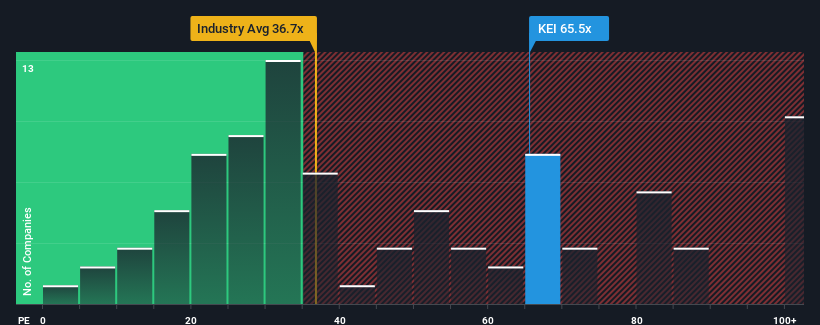Stock Analysis
- India
- /
- Electrical
- /
- NSEI:KEI
KEI Industries Limited (NSE:KEI) Stocks Shoot Up 33% But Its P/E Still Looks Reasonable

The KEI Industries Limited (NSE:KEI) share price has done very well over the last month, posting an excellent gain of 33%. The last month tops off a massive increase of 128% in the last year.
Since its price has surged higher, given close to half the companies in India have price-to-earnings ratios (or "P/E's") below 31x, you may consider KEI Industries as a stock to avoid entirely with its 65.5x P/E ratio. Nonetheless, we'd need to dig a little deeper to determine if there is a rational basis for the highly elevated P/E.
Recent earnings growth for KEI Industries has been in line with the market. One possibility is that the P/E is high because investors think this modest earnings performance will accelerate. You'd really hope so, otherwise you're paying a pretty hefty price for no particular reason.
View our latest analysis for KEI Industries

Is There Enough Growth For KEI Industries?
KEI Industries' P/E ratio would be typical for a company that's expected to deliver very strong growth, and importantly, perform much better than the market.
If we review the last year of earnings growth, the company posted a terrific increase of 20%. The latest three year period has also seen an excellent 120% overall rise in EPS, aided by its short-term performance. Accordingly, shareholders would have probably welcomed those medium-term rates of earnings growth.
Shifting to the future, estimates from the twelve analysts covering the company suggest earnings should grow by 28% over the next year. Meanwhile, the rest of the market is forecast to only expand by 24%, which is noticeably less attractive.
In light of this, it's understandable that KEI Industries' P/E sits above the majority of other companies. Apparently shareholders aren't keen to offload something that is potentially eyeing a more prosperous future.
What We Can Learn From KEI Industries' P/E?
KEI Industries' P/E is flying high just like its stock has during the last month. Using the price-to-earnings ratio alone to determine if you should sell your stock isn't sensible, however it can be a practical guide to the company's future prospects.
As we suspected, our examination of KEI Industries' analyst forecasts revealed that its superior earnings outlook is contributing to its high P/E. Right now shareholders are comfortable with the P/E as they are quite confident future earnings aren't under threat. Unless these conditions change, they will continue to provide strong support to the share price.
The company's balance sheet is another key area for risk analysis. Take a look at our free balance sheet analysis for KEI Industries with six simple checks on some of these key factors.
Of course, you might also be able to find a better stock than KEI Industries. So you may wish to see this free collection of other companies that have reasonable P/E ratios and have grown earnings strongly.
Valuation is complex, but we're helping make it simple.
Find out whether KEI Industries is potentially over or undervalued by checking out our comprehensive analysis, which includes fair value estimates, risks and warnings, dividends, insider transactions and financial health.
View the Free AnalysisHave feedback on this article? Concerned about the content? Get in touch with us directly. Alternatively, email editorial-team (at) simplywallst.com.
This article by Simply Wall St is general in nature. We provide commentary based on historical data and analyst forecasts only using an unbiased methodology and our articles are not intended to be financial advice. It does not constitute a recommendation to buy or sell any stock, and does not take account of your objectives, or your financial situation. We aim to bring you long-term focused analysis driven by fundamental data. Note that our analysis may not factor in the latest price-sensitive company announcements or qualitative material. Simply Wall St has no position in any stocks mentioned.

Simply Wall St
About NSEI:KEI
KEI Industries
KEI Industries Limited manufactures and supplies wires and cables in India.
Flawless balance sheet with high growth potential.
